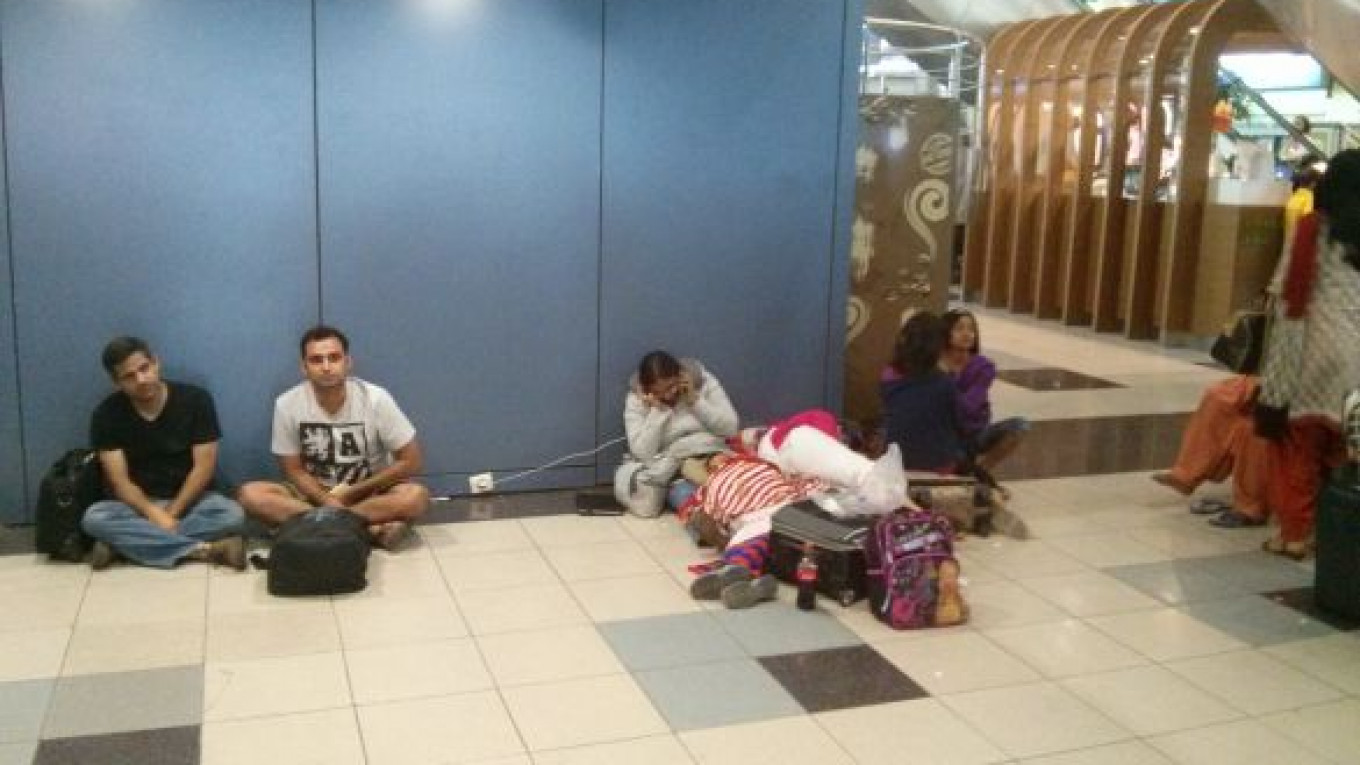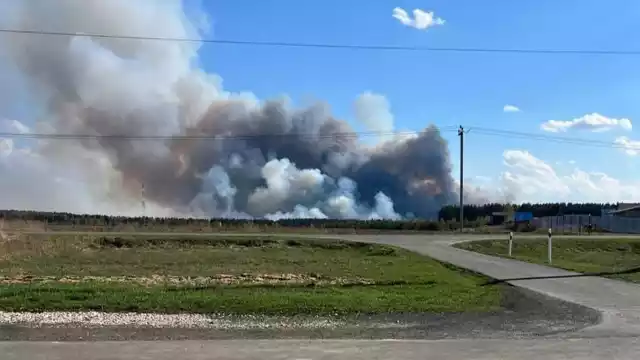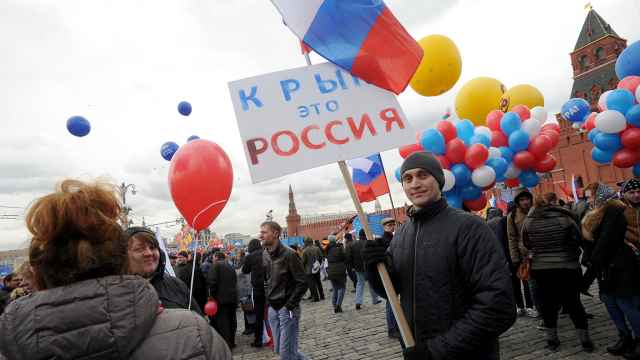Domodedovo Airport 1, United Airlines 0.
That at least seems to be the opinion of the 264 mostly Indian passengers who unexpectedly found themselves stranded in Russia after their United Airlines flight made an emergency landing at the Moscow airport early Tuesday.
The Boeing 777-200 jet traveling from India to the U.S. landed around 4:10 a.m. after pilots detected an unspecified problem with the aircraft’s main battery, Interfax reported, citing airport police.
No one was injured, and no visible damage was found to the aircraft, the report said.
The passengers disembarked at Domodedovo’s international terminal, where they were told that they would have to wait for 19 hours — until 11 p.m. — for repairs allowing the plane to continue its flight from Delhi to Newark, New Jersey. United operates regularly scheduled flights between Domodedovo and Washington.
Anger quickly grew among passengers who had gone to bed hoping to wake up in New Jersey but instead found themselves in Russia without food, a place to sleep or even someone from United Airlines who could answer their questions.
A United Airlines representative responded to a request for comment from The Moscow Times late Tuesday, saying that the airline was providing assistance and meals to passengers and that the rescheduled flight was now set to depart at 6 a.m. Wednesday.
But passengers spent most of the day grasping at straws in their quest for answers.
“This is terrible and needs to be fixed now. It is like being in a prison,” Harry Ghuman, a Nevada-based Indian national whose family was on the flight, said in a plea for help on United Airlines’ Facebook page.
A chorus of frustration swelled as anxious relatives in India and the U.S. chimed in, finally catching the ear of India’s ambassador to Russia, who failed to win assistance from the airline but did manage to convince airport authorities to deliver meals — the first food that some passengers had eaten since deplaning and finding that airport currency exchange booths would not swap their rupees for rubles.
Russian law requires air carriers to provide accommodation and snacks to stranded passengers, but it does not apply to foreign companies. United is subject to U.S. law, which does not have any similar requirements, and to its own internal rules, which oblige it to provide lodging and food in some cases.
United Airlines Flight 83 left Delhi with 264 passengers and 16 crew members at 10:55 p.m. Monday — five minutes late, according to United. Just a few hours into the flight, the pilots decided to make the emergency landing in Moscow, which airport police described as smooth and uneventful.
No one checked the passengers’ passports when they disembarked, and the passengers clustered for hours in the waiting area around Gate 22, anxious for news about their fate. They had nothing to do but wait and make what they called futile efforts to use their cell phones and e-mail accounts to get information from United Airlines.
Several hours into the ordeal, passengers and relatives appealed to India’s ambassador to Russia.
“There has been no provision for snacks (many Indians may need veggie snacks) nor a place to rest (airline should allow for hotel),” Namrita Khandelwal, whose sister was among the passengers, said in an e-mailed appeal to Ambassador Ajay Malhotra.
“Passengers may not be equipped to handle Moscow’s cold weather either,” she said in the e-mail, a copy of which she sent to The Moscow Times.
Within a couple hours, the ambassador had intervened, contacting the U.S. airline and winning a promise of assistance from airport authorities.
“On checking with the Domodedovo Airport authorities, we are informed that they have the information about the landing of your United Airlines flight and are finding ways to help the stranded,” he said in an e-mail to passengers, a copy of which was provided by Khandelwal.
“United Airlines inform that they only have a ticketing office in Moscow and do not have any representative office and are thus, apparently, not in a position to help,” he said, adding that he had asked embassy first secretary Shri K.V. Sreejesh to handle the issue.
Khandelwal’s sister, Sweta, described a scene of frustration at the airport.
“The only currency accepted here is the local currency. Many Indians do not have international credit cards. People with kids are having a hard time. There is limited seating available at the airport,” said Sweta Khandelwal, an Indian national and attorney practicing U.S. immigration law in Santa Clara, California. She made the comments via e-mail.
Some time later she said airport authorities had provided the passengers with a meal.
“Things here seem a bit better. We have got some food, though most of it was meat,” she said.
Despite the meat, which is off-limits to many Indians, she said the passengers were filled with praise for Domodedovo, Moscow’s only private airport and whose pioneering modernization efforts forced cross-town rival Sheremetyevo Airport to build new terminals and significantly improve its services.
“We are all praises for the airport staff. They are trying their best to help,” Khandelwal said.
“On the positive side,” she added, Domodedovo is “one of the few international airports with unlimited free Wi-Fi!”
Under Russian law, airlines are required to provide drinks to passengers if a flight is delayed for more than two hours and give them hot snacks if it is postponed for more than four hours.
Air carriers are also obliged to provide passengers with hotel accommodation in case of delays longer than eight hours during daytime and longer than six hours at night. All these services must be free.
But this law only applies to domestic companies, said Sergei Klimenko, a lawyer at Khrenov and Partners. Russian authorities have no license-related or other tools to influence foreign airlines, he said.
Passengers can only sue United Airlines in the U.S., he said.
However, United Airlines is subject to U.S. law and has its own corporate rules for such situations, and passengers should know them to understand what their rights are, Klimenko said. Passengers could also appeal to international aviation conventions that are applicable in this case, he added.
U.S. federal law does not require airlines to provide food and accommodation to stranded passengers. But, according to United Airlines’ Contract of Carriage, the airline is required to provide snacks and lodging unless the delay is due to circumstances outside its control.
Meanwhile, any domestic airline registered in Russia should comply with Russian legislation regardless of whether its passengers are stranded in the country or abroad, Klimenko said.
In e-mailed comments late Tuesday, Kevin Johnston, a United representative, said the final flight had been delayed “because necessary maintenance work could not be completed before the crew exceeded their legally permitted duty hours.” He said that the airline apologized for the inconvenience.But the apology was unlikely to sit well with passengers like Sweta Khandelwal, who was unrelenting in her criticism of United Airlines.
“The most disappointing and frustrating thing has been the utter disregard and lack of response from UA representatives,” she said.
That sentiment was echoed by Ghuman, the Nevada-based businessman with family on the flight. He complained that United representatives whom he had contacted by phone had no information on the flight and could not reach anyone in Moscow.
United later provided Ghuman with another phone number to call.
“Spoke to United again. Again no clue when someone will have answer,” Ghuman said. He added that United officials had told him: “You can leave the airport if you have a Russian visa, but we don’t know” what is happening on the ground.
Correction
An earlier version of this article incorrectly said that United Airlines offers regular flights between Domodedovo Airport and Washington. That service, launched in 2009, was canceled in August 2012.
Contact the authors at mcchesney@imedia.ru and o.sukhov@imedia.ru
A Message from The Moscow Times:
Dear readers,
We are facing unprecedented challenges. Russia's Prosecutor General's Office has designated The Moscow Times as an "undesirable" organization, criminalizing our work and putting our staff at risk of prosecution. This follows our earlier unjust labeling as a "foreign agent."
These actions are direct attempts to silence independent journalism in Russia. The authorities claim our work "discredits the decisions of the Russian leadership." We see things differently: we strive to provide accurate, unbiased reporting on Russia.
We, the journalists of The Moscow Times, refuse to be silenced. But to continue our work, we need your help.
Your support, no matter how small, makes a world of difference. If you can, please support us monthly starting from just $2. It's quick to set up, and every contribution makes a significant impact.
By supporting The Moscow Times, you're defending open, independent journalism in the face of repression. Thank you for standing with us.
Remind me later.






